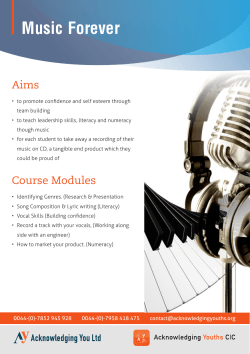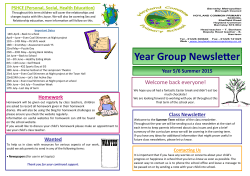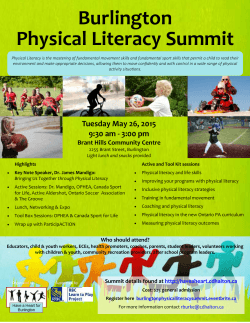
Sciences, term 2, 2015
This newsletter and the Secondary Student Achievement Professional Learning and Development initiative is funded by the Ministry of Education. The providers are The University of Auckland and Te Tapuae o Rehua consortium. National Newsletter: All Sciences including Agricultural and Horticultural Science Information and resources for middle leaders in secondary schools | Term 2 2015 Tena koe, Greetings to you all, Kia orana, Fakaalofa lahi atu, Malo e lelei, Talofa lava, Talofa ni Welcome to the Sciences for term 2 2015. In 2014 newsletters we looked at different aspects contributing to quality teaching practice. We are continuing this focus in 2015 by revisiting the aspects of effective pedagogy from the New Zealand Curriculum. In this issue: Inclusive practice Supportive learning environments Effective literacy and scientific literacy Junior assessments with NOS focus Innovative cross curricular possibilities Subject alerts What is inclusive practice? Schools continue to work on developing inclusive practices for all students. A recent addition to resources that can support teachers to feel more confident and capable in this work is on TKI as “Guides for Inclusive Educators”. This site presents a range of resources for Years 0 -13 teachers. It includes a range of video clips demonstrating inclusive practice within a variety of school settings. More information to guide classroom practice can be found at http://inclusive.tki.org.nz/guides/developing-an-inclusive-classroom-culture/ How can a supportive learning environment be created in classrooms? In a supportive classroom “learning is inseparable from its social and cultural context” (NZC 2007, p34). The teacher plays a key role in this process by ensuring positive relationships exist in the classroom that convey to students that they care about them and their learning. Thus the classroom atmosphere will be inclusive, cohesive and will not discriminate some learners (NZC, 2007, p 34). Science teaching and learning programmes provide a unique learning environment for students. To create a more supportive environment, science classrooms need to provide opportunities to practice using new science ideas to form long-term memories. In science classrooms, teachers must: build science content knowledge make explicit Nature of Science understandings develop the set of process skills unique to science build both literacy and scientific literacy capability So why should science provide effective literacy and scientific literacy support? Data collated by Starpath research from observations in Year 7-10 Science classrooms indicated that students had limited exposure to text. In fact, most classroom texts were short texts (fewer than 10 words) that were created by the teacher. Students were provided support in subject specific vocabulary but received little support in other aspects of literacy and language. 2013 data from National Standards results show some improvement in Reading, Mathematics and Writing from 2011-13. Writing is identified as lower in achievement levels than Reading or Mathematics. Overall, 70.6% of students are at or above the national standard in writing, compared to 77.9% of students in Reading. Girls achieve better than boys. Māori and Pasifika students are not achieving as well in writing, compared to Pākehā. (National Standards summary, 2014) Secondary Student Achievement Professional Learning and Development - National Newsletter National Co-ordinators Mikhal Stone Northern and Central North regions m.stone@auckland.ac.nz Mob: 021 1871 664 Kate Rice Central South and Southern regions kate.rice@otago.ac.nz Mob: 021 793 771 Regional Facilitators The University of Auckland Northern region Ian McHale i.mchale@auckland.ac.nz Natalie De Roo n.deroo@auckland.ac.nz Central North region Simon Taylor sp.taylor@auckland.ac.nz Te Tapuae o Rehua Central South region Stephen Williams stephen.williams@otago.ac.nz Central South, Southern regions Judith Bennetts judith.bennetts@canterbury.ac.nz Kate Rice kate.rice@otago.ac.nz Southern region Sabina Cleary sabina.cleary@canterbury.ac.nz Starpath report can be downloaded from https://cdn.auckland.ac.nz/assets/ education/about/research/docs/sta rpath/Starpath%20Annual%20Rep ort%202014.pdf Of particular note, 62.7% of year 7 students were at or above the national standard in writing at the end of 2013. This is the group of students entering year 9 in 2015, so it is important to address their reading and writing needs in Science where achievement is so dependent on their literacy capability. In many of the schools observed, lessons were characterized by whole class question and answer sessions, followed by individual work where teachers rove and assist. Alongside this was largely undifferentiated instruction, especially in year 9 and 10 classrooms with little focus on developing students’ critical literacy or strategy use. Whether reading or writing or analyzing information, it’s entirely possible for a student to appear to have learned in the lesson – but to know nothing about it next week. According to Evidence Based Teaching Newsletter the brain-cells have reset to zero because the pathway has not been exercised in time. Quoted from www.ebtn.org.uk Evidence Based Teaching newsletter Research distinguishes between ‘massed-practice’ which happens at the end of the topic and ‘spaced practice’ which happens at regular intervals after the first learning. The classroom evidence is backed-up by the neuroscience – spaced practice is much more effective (the effect size is 0.7 – high). In summary, support in science should address a wide range of literacy strategies to build student confidence. Strategies to support this process are being shared in the national workshops. Answer the NCEA question: Describe and Explain!! In science learning, many critical skills used by students in reading and writing are often core skills needed in their study. In order to succeed at NCEA, students must be able to describe, explain, analyse or discuss and create understanding of what these look like. So what do we as teachers need to know in order to ensure their success in science? What strategies will help my students to learn? What does literacy in science look like? Being able to distinguish between describe and explain is vital and can often be confused. Describe requires an answer that says what something is like, how it works and lists what happens. For example: Name the gas and describe its properties. On the other hand, explain requires an answer that offers a rather detailed and exact explanation of a scientific idea, concept or process, or a set of scientific reasons how things work or how they came to be the way they are. For example: Explain why you might need to use this specific metal to make a specific object such as a fishing lure. Often questions require both parts to be addressed: Describe the function…. and explain how this allows it to be used to… Can your students describe patterns in graphs or explain how to link the patterns in results to the predictions made? This skill is needed in curriculum levels 4-5 and to move students even further to level 6 would require them to give an explanation for patterns or relationships between variables using their science knowledge and understanding. In addition they will need to make predictions on the basis of trends or patterns that they found in the results. Knowing and using the relevant language can help greatly. For example: Ask students to consider how the eye works. After reflecting on this they could list all the lights and colours one can see. Predicting how it would be if you were sitting outside rather than inside, Before,…after/ later. To build students’ vocabulary around the topic, have them make a list of the words to use to explain light from reading relevant texts. To scaffold the writing, give suggested words/phrases to complete their description and explanation in responding to a question such as “How does the eye work?” Describing initially does not necessarily involve scientific language but explaining will require science knowledge and language in giving reasons for the description. For example, a student response might be: Description: Our eyes work with our brains to tell us the size, shape, color, and texture of an object. Explanation: In the eye, light from distant objects is focused onto the retina at the back of the eye. “Well, your eye sends the picture to your brain, and your brain turns the picture the right way up and tells you what you are looking at. So you see things the right way up.” Using words such as “ so” or “because” are indicating that the explanation is happening. Secondary Student Achievement Professional Learning and Development - National Newsletter Ideas on approaches to use in science can be found on Literacy on line on TKI http://literacyonline.tki.org.nz /Literacy-Online/SecondaryLiteracy/Teacherneeds/Literacy-in-thelearning-areas2/Literacy-inScience/Teaching-InquiryPlanning-to-meet-studentneeds A sample unit plan for Material World can also be found at: http://esolonline.tki.org.nz/ES OL-Online/Teacherneeds/Teaching-and-learningsequences/Units/Secondarymainstream For further literacy support materials and examples: Check out some activities on our wiki site that you may be able to use in building student skills Teacher reflections Quotes from the national workshops Rethinking Science Investigations in Junior Science: Loved the workshop and loved the content – particularly challenged my thinking with pattern-seeking vs fair testing – I think I get it – but need to share this with my department now!! Many thanks for the workshop preparation and delivering a great session. You changed my thinking on things. I am coming around to shifting the balance of what I teach in regards to knowledge verses investigation. I think now that this balance needs to be adjusted depending on your class and where they are likely to head after Year 10. Science online http://scienceonline.tki.org.nz/Ne w-resources-to-support-scienceeducation Remember to explore the materials on the Science Capabilities and Use of Digital Learning Technologies in Science Hopefully your department has had the opportunity to follow up and reflect on the messages from the workshop series and has spent time rethinking the teaching and learning needed to engage with the intent of the NZC aspects of Investigating in Science. Through focusing on the necessary teaching and learning, students will become engaged in the processes of science rather than on the recall of content knowledge that has little relevance to their daily lives. Junior assessments with a Nature of Science (NoS) focus One school in Northland has decided to ensure the school focus on Nature of Science (NoS) in Year 9 and 10 is maintained by assessing all their topics using the process skills from the NoS strands of the New Zealand Curriculum. Rather than a content recall test the school is producing assessments which allow students to show the process skills they are building through NoS teaching and learning. The first topic contained familiar content around atomic structure and the periodic table. The summative assessment however, was not a content recall test, instead students had to write about the scientists who had helped develop the theories and how their discoveries had adapted or altered the theories. This approach has maintained a focus on the Understanding about Science strand through the context of the material world. The second topic is electricity but the assessment might require students to show their understanding through Communicating in Science (using circuit diagrams and conventions) or Investigating in Science (using models to explain understanding) or both. Energy has already been picked as an ideal topic to consider using Participating and Contributing (which alternative energy type is best for a particular environment).Using this approach the content is still being used as the context but the Nature of Science strands are also constantly considered. Innovative cross-curricular possibilities A South Island HOF, frustrated with the lack of engagement of his Year 11 boys, has been funded to purchase an off road motorbike that the class is rebuilding. Throughout the process they will have the opportunity to gain credits in Science – on Heat, Metals and Physics 1.1 and possibly Fuels from Earth and Space Science and Material World perspectives. Students are also being dually assessed for an English Static Image assessment and a Technology unit on Mechanisms. One boy is working on a graphics assessment as he designs and paints the fuel tank. There may also be further assessment opportunities as the year progresses. Secondary Student Achievement Professional Learning and Development - National Newsletter For a source of useful NZ scientific research material ready to use to stimulate student thinking relating to the Nature of Science and the Science Capabilities go to: http://www.allanwilsoncentre.ac. nz/massey/learning/departments /centres-research/allan-wilsoncentre/ourresearch/resources/educationalresources.cfm For a source of resources on a wide range of contexts and science stories including teaching ideas, reading resources and NZ scientific research material ready to use to stimulate student thinking relating to the Nature of Science and the Science Capabilities go to: http://sciencelearn.org.nz/ The Science Learning Hub also offers on line professional development opportunities Subject specific alerts: conferences This is the year of single-subject conferences, as opposed to SCICON (Science) which occurred last year. In 2015 NZIP (Physics) has their conference 6-8 July at Waikato University, Hamilton. BioLive (Biology) and ChemEd (Chemistry) are holding a joint conference, 5-8 July at Victoria University, Wellington. HATA’s (Agriculture/Horticulture) conference is 12-15 April at St Andrews College, Christchurch. These conferences are a great opportunity to: Get some new learning in your subject area Network with other teachers of your subject from around the country Be inspired by keynote speakers Explore the latest in science resources from the associated “trade fair” Find out what your subject association is up to. If you have never been to a conference it is worth trying to get there. Conferences are where you pick up new ideas to enliven your teaching. If you have attended before but not presented, consider presenting. After all, the workshops are mostly teachers presenting from their experience. What are you working on in your teaching at present? What have you learnt/tried recently? Present with someone else if it is too daunting to attempt by yourself. NZQA information for all subjects 1. 2. Exemplars on the NCEA Subject Resources pages for Level 1, 2 and 3 will be progressively updated during the year. An Assessment Matters circular provides more detail around the purpose of these documents and how Facebook can be used to provide an alert system when material is updated. Best Practice Workshops (Making Assessor Judgments). The sciences schedule is below – we are advised there is no need to attend yearly as many of these are duplicates of last year’s workshops. Workshops run from 9:30am – 3:30 pm, $120 per person. Book online (registrations close 3 weeks before the workshop). AgHort Biology Chemistry ESS Physics Science 3. Auckland 28 Jul 23 Jun 23 Nov 29 Jul 23 Nov 28 Jul Wellington Christchurch 9 Jun 15 Sep 11 Aug 1 Sep 15 Sep 8 Sep 20 Aug 9 Sep For some subjects version numbers, but not the standards themselves, have been updated: Bio: Level 1 achievement standards are now version 3. Level 2 achievement standards are now version 2. ESS: Level 2 achievement standards are now version 2. Science: Level 1 achievement standards are now version 3. Level 1 unit standards are now version 5. Notification of all updates relevant to internally assessed standards can be received via NZQA’s Facebook pages for each subject. These pages can be located by typing the subject name and NZQA into the Facebook search tool. The link alerts people to new or updated information on the NCEA Subject Resources pages. To receive these updates, teachers need to click ‘Like’ and alerts will appear in Facebook News Feed when updates are posted. The Facebook pages are not intended as a forum for discussion, or for submitting comments or queries related to posts. Secondary Student Achievement Professional Learning and Development - National Newsletter Useful links and resources Conference websites NZIP http://confer.co.nz/nzip2015/ BioLive/ChemEd www.biolivechemed.nz To access HATA conference website you need to be a member http://hatanz.com/ Literacy and Numeracy page on NZQA site There is a new Literacy and Numeracy landing page live on NZQA. It was developed in order to have all of the information from NZQA and TKI sites accessible in one place - worth bookmarking for easy access. http://www.nzqa.govt.nz/qual ificationsstandards/qualifications/ncea/ subjects/literacy-andnumeracy/ Secondary Student Achievement professional development This newsletter is developed by the Science National Coordinators of the Secondary Student Achievement professional learning and development. Secondary Student Achievement professional development is funded by the Ministry of Education and covers every learning area. The Government goal is that 85% of all 18-year-olds will have achieved NCEA Level 2 or an equivalent qualification by 2017. Support is available to all middle leaders in the form of workshops, clusters and enewsletters in every learning area and in a range of subjects. Intensive, in-depth support is also being provided for schools that have been successful in their application to the regional Ministry offices.
© Copyright 2025










